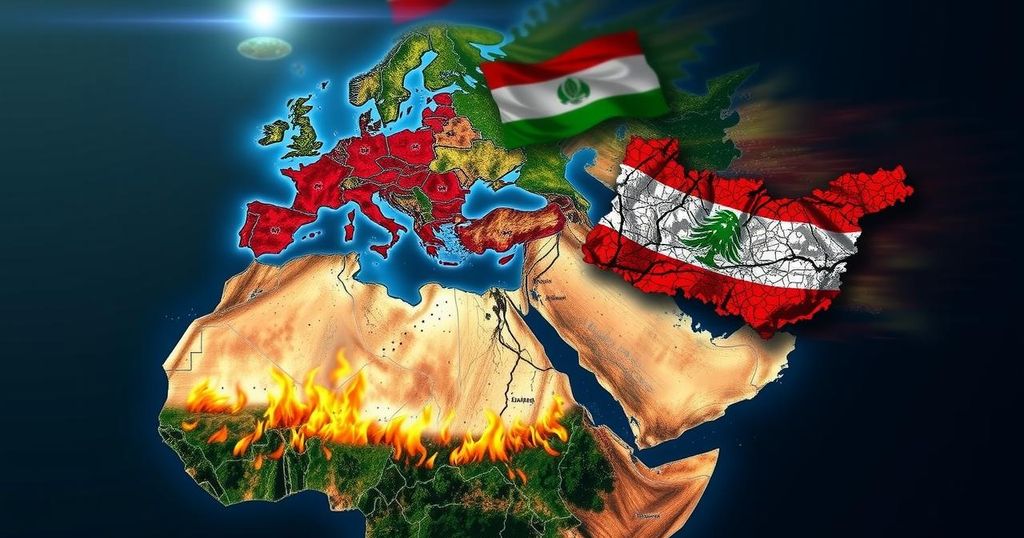Overview of Current Global Humanitarian Crises in Sudan, Gaza, Lebanon, Haiti, Ukraine, and Syria
This article outlines pressing humanitarian crises occurring in Sudan, the Occupied Palestinian Territory, Lebanon, Haiti, Ukraine, and Syria. Critical issues include violence against women, infrastructural damage, and the urgent need for aid amid ongoing conflicts. International leaders emphasize the necessity for enhanced support and coordination to address the humanitarian needs of affected populations.
In a pressing global context, various crises continue to unfold in Sudan, the Occupied Palestinian Territory, Lebanon, Haiti, Ukraine, and Syria. In Sudan, Under-Secretary-General for Humanitarian Affairs, Tom Fletcher, has highlighted the staggering scale of the humanitarian crisis, now exacerbated by displacement and violence against women. His recent visit included meetings with displaced persons and local authorities. The World Food Programme initiated a new air service to enhance aid delivery amid increasing humanitarian needs.
In the Occupied Palestinian Territory, severe flooding in Khan Younis and Gaza City has compounded the struggles of displaced families, affecting approximately 1.6 million individuals. Local agencies are mobilizing responses amid challenges such as active hostilities and logistical obstacles, while hospitals, like Kamal Adwan, have come under continued fire, resulting in injuries among medical personnel and patients, prompting urgent calls from WHO leadership.
Lebanon is grappling with unprecedented humanitarian crises, following a significant escalation in violence that has resulted in deaths and forced displacement. According to OCHA, the nation has witnessed alarming casualty rates, including numerous child fatalities. Educational and health institutions face immense challenges as UNICEF coordinates emergency aid to affected populations.
In Haiti, a surge in gender-based violence prompts attention on women’s and children’s safety. Reports indicate a concerning recruitment of minors into armed groups, exacerbating an already critical humanitarian landscape as essential services remain underfunded amidst the country’s turmoil.
Ukraine continues to experience ongoing hostilities, resulting in casualties and infrastructural damage, especially in regions like Kharkiv and Odesa. Humanitarian organizations are mobilizing to provide emergency assistance amid dropping temperatures that threaten vulnerable families.
Finally, in Syria, continued attacks have resulted in civilian casualties, drawing attention from humanitarian leaders to the difficulties facing healthcare facilities, with insufficient funding limiting the response capacity for millions in need. Amid these crises, the support from global humanitarian organizations remains vital.
Recent conflicts and humanitarian crises across various regions have invoked urgent international attention. Sudan continues to face a catastrophic humanitarian disaster, marked by ongoing violence and the significant displacement of civilians. The situation in Gaza reflects similar struggles, with environmental disasters compounding the already severe humanitarian conditions. In Lebanon, violence has reached alarming levels, resulting in significant civilian casualties, while Haiti grapples with a pervasive crisis affecting women and children disproportionately. Ukraine remains embroiled in conflict, aggravating humanitarian conditions amid harsh winter weather, and the situation in Syria highlights ongoing violence and a dire lack of funding for humanitarian needs.
In conclusion, the alarming humanitarian crises unfolding in Sudan, the Occupied Palestinian Territory, Lebanon, Haiti, Ukraine, and Syria underscore the pressing need for comprehensive international response and support. With various factors exacerbating the suffering of civilians, coordinated efforts to enhance aid delivery, protect vulnerable populations, and ensure funding for essential services are necessary to alleviate the ongoing crises. The international community must remain vigilant and responsive to these urgent situations to mitigate suffering and address the profound challenges faced by millions.
Original Source: www.unocha.org




Post Comment